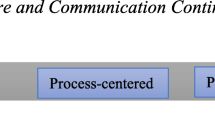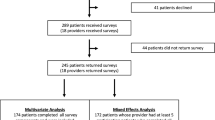Abstract
Objectives
To study the preferences of cancer patients and their families in way of being informed of their condition and, by comparing their preferences with the medical staff’s clinical practices, explore the factors underlying the latter’s preferences.
Methods
A survey was conducted with 216 cancer patients, 242 families, and 176 clinical staff members with the Medical Status Communication questionnaire (Simplified Chinese edition).
Results
The clinical staff scored lower than the cancer patients and their families in terms of the total score, way of communication, emotional support, and additional information (F = 16.134, p < .001; F = 28.604, p < .001; F = 13.839, p < .001; F = 16.745, p < .001). Factors underlying the medical staff’s clinical practices included, as revealed by the multiple linear regression analysis, gender (p = .03), and willingness to improve the way of communication about cancer (p = .006).
Conclusions
A gap existed between the medical staff’s clinical practice and the preferences of the cancer patients and their families. The medical staff should receive adequate training in cancer communication skills and techniques for improvement in this respect. When designing training for skills in delivering bad news to cancer patients, the well-being of cancer patients and their families must be thoroughly considered, and patient demands for information should be satisfied in the context of the information explosion of the current age.
Similar content being viewed by others
References
Buckman R (1984) Breaking bad news: why is it still so difficult? BMJ 288(6430):1597–1599
Roberts CS, Cox CE, Reintgen DS, Baile WF, Gibertini M (1994) Influence of physician communication on newly diagnosed breast patients’ psychologic adjustment and decision-making. Cancer 74(1 Suppl):336–341
Schofield PE, Butow PN, Thompson JF, Tattersall MH, Beeney LJ, Dunn SM (2003) Psychological responses of patients receiving a diagnosis of cancer. Ann Oncol 14(1):48–56
Girgis A, Sanson-Fisher RW, Mccarthy WH (1997) Communicating with patients: surgeons’ perceptions of their skills and need for training. Aust N Z J Surg 67(11):775–780
Cherny NI (2011) Factors influencing the attitudes and behaviors of oncologists regarding the truthful disclosure of information to patients with advanced and incurable cancer. Psycho-Oncology 20(12):1269–1284
Goelz T, Wuensch A, Stubenrauch S (2011) Specific training program improves oncologists’ palliative care communication skills in a randomized controlled trial. J Clin Oncol 29(25):3402–3407
Butow PN, Kazemi JN, Beeney LJ, Griffin AM, Dunn SM, Tattersall MHN (1996) When the diagnosis is cancer: patient communication experiences and preferences. Cancer 77(12):2630–2637
Parker PA, Baile WF, de Moor C, Lenzi R, Kudelka AP, Cohen L (2001) Breaking bad news about cancer: patients’ preferences for communication. J Clin Oncol 19(7):2049–2056
Fujimori M, Akechi T, Morita T, Inagaki M, Akizuki N, Sakano Y, Uchitomi Y (2007) Preferences of cancer patients regarding the disclosure of bad news. Psychooncology 16(6):573–581
Chen W, Zheng R, Baade PD, Zhang S, Zeng H, Bray F, Jemal A, Yu XQ, He J (2016) Cancer statistics in China, 2015. CA Cancer J Clin 66(2):115–132
Fan ZY, Fang JK, Zhang LL (2018) Progress in preferences in cancer disclosure. J Med Philos 39(5B):61–64 (in Chinese)
Tang WR, Fang JT, Fang CK, Fujimori M (2013) Truth telling in medical practice: students’ opinions versus their observations of attending physicians’ clinical practice. Psycho-Oncology 22(7):1605–1610
Tang WR, Hong JH, Rau KM, Wang CH, Juang YY, Lai CH, Fujimori M, Fang CK (2017) Truth telling in Taiwanese cancer care: patients’ and families’ preferences and their experiences of doctors’ practices. Psycho-Oncology 26(7):999–1005
Pang Y, Tang L, Zhang Y, Song L, Goelz T, Fritzsche K, Wuensch A (2015) Breaking bad news in China: implementation and comparison of two communication skills training courses in oncology. Psycho-Oncology 24(5):608–611
Gao F, Huang YY, Wei ZM et al (2017) The preliminary research on “shared decision making” model: taking an example on cancer treatment. J Med Philos 38(4B):1–4 (in Chinese)
Mitchison D, Butow P, Sze M, Aldridge L, Hui R, Vardy J, Eisenbruch M, Iedema R, Goldstein D (2012) Prognostic communication preferences of migrant patients and their relatives. Psychooncology 21(5):496–504
Fujimori M, Shirai Y, Asai M, Kubota K, Katsumata N, Uchitomi Y (2014) Effect of communication skills training program for oncologists based on patient preferences for communication when receiving bad news: a randomized controlled trial. J Clin Oncol 32(20):2166–2172. https://doi.org/10.1200/jco.2013.51.2756
Chen J, Qian F, Yan W et al (2013) Translational biomedical informatics in the cloud: present and future. Biomed Res Int 2013:1–8
Lai ZD, Yang JZ (2013) The study on the impact of the Internet on doctor-patient relationships. J Med Philos 11(06):36–37 (in Chinese)
Wang HJ, Feng YL (2017) Effect of “internet +healthcare” on the traditional healthcare service delivery mode and physician-patient relationship and the suggested couterneasures. Chinese General Practice 20(25):3191–3194 (in Chinese)
Harvey S, Memon A, Khan R (2017) Parent’s use of the Internet in the search for healthcare information and subsequent impact on the doctor-patient relationship. Ir J Med Sci 186(4):821–826
Maguire P (1990) Can communication skills be taught? Br J Hosp Med 43(3):215–216
Baile WF, Buckman R, Lenzi R, Glober G, Beale EA, Kudelka AP (2000) SPIKES—a six-step protocol for delivering bad news: application to the patient with cancer. Oncologist 5(4):302–311
Fujimori M, Akechi T, Akizuki N, Okamura M, Oba A, Sakano Y, Uchitomi Y (2005) Good communication with patients receiving bad news about cancer in Japan. Psychooncology 14(12):1043–1051
Tang WR, Chen KY, Hsu SH, Juang YY, Chiu SC, Hsiao SC, Fujimori M, Fang CK (2014) Effectiveness of Japanese SHARE model in improving Taiwanese healthcare personnel’s preference for cancer truth telling. Psychooncology 23(3):259–265. https://doi.org/10.1002/pon.3413
Cui XS, Di J, Luo J (2016) An investigation of modes appropriate to Chinese cancer patients for delivery of bad news. Psychology 21(23):249–251 (in Chinese)
Acknowledgments
The authors would like to thank all participating patients, family members, and medical staff, and are grateful to Professor Woung-Ru Tang of the Department of Nursing, Chang Gung University, Taiwan, for providing the medical status communication questionnaire (Simplified Chinese edition).
Author information
Authors and Affiliations
Corresponding authors
Ethics declarations
The study protocol was approved by the institutional review boards of the study hospitals (NFEC-201709-K15).
Conflict of interest
The authors declare that they have no conflict of interest.
Rights and permissions
About this article
Cite this article
Fan, Z., Chen, L., Meng, L. et al. Preference of cancer patients and family members regarding delivery of bad news and differences in clinical practice among medical staff. Support Care Cancer 27, 583–589 (2019). https://doi.org/10.1007/s00520-018-4348-1
Received:
Accepted:
Published:
Issue Date:
DOI: https://doi.org/10.1007/s00520-018-4348-1




